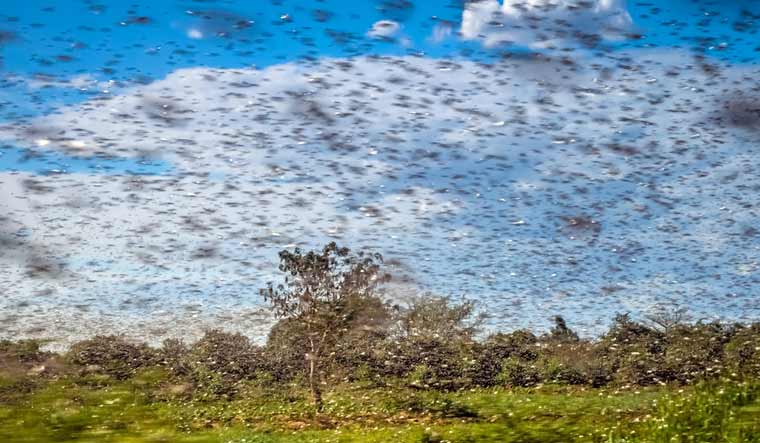Uttar Pradesh is guarding itself against a possible locust attack on its sugarcane farms by conducting awareness campaigns for farmers.
The state’s Cane Commissioner to Sugar Industry & Cane Development Department Sanjay Bhoosreddy has issued directions to constantly survey and monitor the situation and at the first indication of an attack spray them immediately with insecticides such as chlorpyrifos 20 per cent EC, chlorpyrifos 50 per cent EC, Bundiomethrin, Fipronil, and Lambda. “To ensure immediate measures for its prevention, sugarcane farmers should inform the concerned institutions of the Government of India and also inform the Cane Development Department immediately”, read a statement issued by him.
Locust are a menace as they attack in large number and eat green leaves of any kind of vegetative plant quickly and in very high quantity. They become active in periods of less rainfall, drought and summer though they breed and grow in the winter, spring and summer. Their seasonal migration is influenced by temperature, wind and vegetation. Locust outbreaks, frequently reported from Gujarat and Rajasthan, have been noticed in the border areas of UP. Hence the state is cautious about the situation.
The state’s preventive measures include distribution of pamphlets and handbills to farmers besides publication of pest prevention measures in daily newspapers. Pest prevention measures are also to be written on the walls of all offices and warehouses to convey information to all farmers. Regional and district officers have been allocated targets based on the area to keep watch regularly and to visit the villages continue to make the farmers aware and take adequate precautions to thwart the possible attack of the said insect.
Locust invasions have devastating effects. According to Anil Sharma, former Plant Protection Officer and Desert Locust Expert from Rajasthan, these can lead to famine, disruption of trade, abandonment of cultivation, diversion of labour and heavy expenditure on control measures etc.
Speaking at the Anil Agarwal Dialogue, 2020 organised by the Centre for Science and Environment, Sharma said, “Locusts have the power to disrupt all human activities. Yellow locusts fly in swarms, that could include as many as one billion of them. Rail and air travel can be brought to a complete halt when a locust attack happens”.
However, Sharma is also of the view that the chances of a large-scale locust attack in UP are dim. “Locusts need desert conditions to survive. It is unlikely that they will survive in UP’s climatic conditions,” he told THE WEEK.



